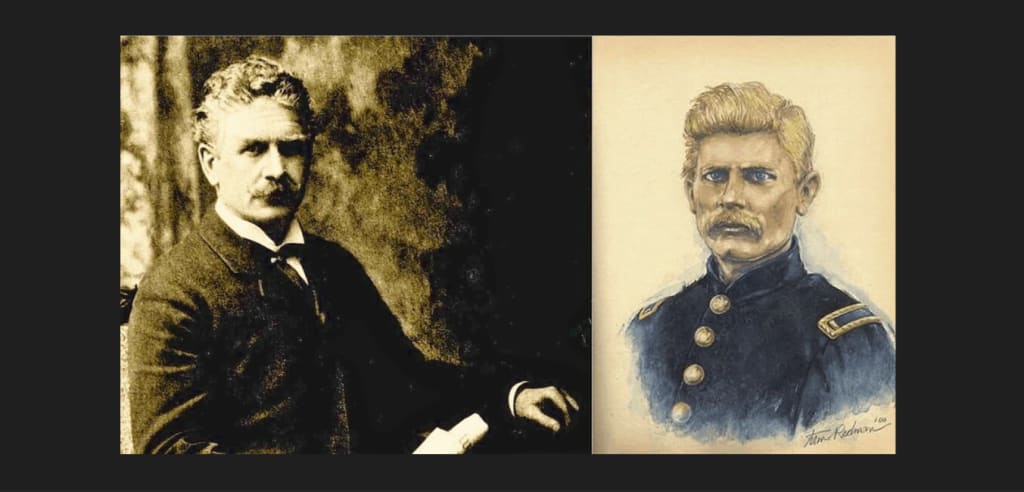The Many Deaths of Ambrose Bierce
Ambrose Bierce (1913) - The American writer disappeared in Mexico while traveling with revolutionary Pancho Villa.

The mystery of Ambrose Bierce’s disappearance is one of the most enigmatic tales in literary history. Known for his sharp wit and dark, satirical writing, Bierce was a prominent American author and journalist. His works, such as "The Devil's Dictionary" and "An Occurrence at Owl Creek Bridge," secured his place in American literature. However, it is not just his literary achievements that have cemented his legacy, but also his mysterious and sudden disappearance in 1913.
Ambrose Bierce was born in 1842 in Ohio and had a career as varied as his writing. He fought in the American Civil War, an experience that deeply influenced his later works, particularly his short stories about war and death. After the war, he moved to San Francisco, where he became a journalist and gained notoriety for his biting critiques and satirical style. By the early 20th century, Bierce was a well-established literary figure, known as "Bitter Bierce" for his acerbic tone.
In October 1913, at the age of 71, Bierce embarked on a journey to revisit the battlefields of the Civil War, ostensibly to reflect on his past and perhaps to find closure. His journey took him through the southern United States and into Mexico, which was in the throes of the Mexican Revolution. Bierce sent several letters to friends and family from various locations, detailing his travels and his observations of the conflict. His last known correspondence was dated December 26, 1913, from Chihuahua, Mexico, in which he wrote to his close friend, Blanche Partington: "As to me, I leave here tomorrow for an unknown destination."
After that letter, Ambrose Bierce vanished without a trace. His disappearance has spawned numerous theories and speculations, each adding to the intrigue surrounding his fate. One theory posits that Bierce joined Pancho Villa’s revolutionary forces and was killed in action. Some accounts claim he was executed by a firing squad, while others suggest he succumbed to illness or injury in the harsh Mexican landscape.
Another theory suggests that Bierce, known for his fascination with death and the macabre, may have orchestrated his own disappearance as a final, dramatic statement. This theory aligns with his known disdain for conventionality and his morbid sense of humor. Some believe he might have sought a solitary end, far from the familiar world, embracing the mystery and uncertainty he often wrote about.
There are also suggestions that Bierce may have encountered foul play unrelated to the revolution. The political and social chaos of Mexico at the time made it a dangerous place for any foreigner. He could have fallen victim to bandits or local militias. However, there is no concrete evidence to support any specific outcome.
In the decades following his disappearance, numerous people have claimed to have seen Bierce or to have information about his fate. These sightings, however, have never been substantiated. His disappearance remains one of the most tantalizing unsolved mysteries, partly because Bierce himself seemed to embrace the enigmatic. His writings often explored themes of reality versus illusion, the fragility of human existence, and the fine line between life and death.
Bierce's disappearance has also inspired countless literary and historical explorations. Many writers and historians have tried to piece together his final days, but the lack of definitive evidence means that his fate is still open to speculation. Each new theory adds to the tapestry of mystery that surrounds his final journey.
Ambrose Bierce’s life and works continue to be studied and celebrated, and his disappearance only enhances his legend. He was a man who lived on his own terms and disappeared in a manner befitting his complex character. Whether he met his end through violence, illness, or by his own design, Bierce's final act remains shrouded in mystery.
About the Creator
Marveline Merab
“History never repeats itself. Man always does.”
― Voltaire
Enjoyed the story? Support the Creator.
Subscribe for free to receive all their stories in your feed. You could also pledge your support or give them a one-off tip, letting them know you appreciate their work.






Comments
There are no comments for this story
Be the first to respond and start the conversation.